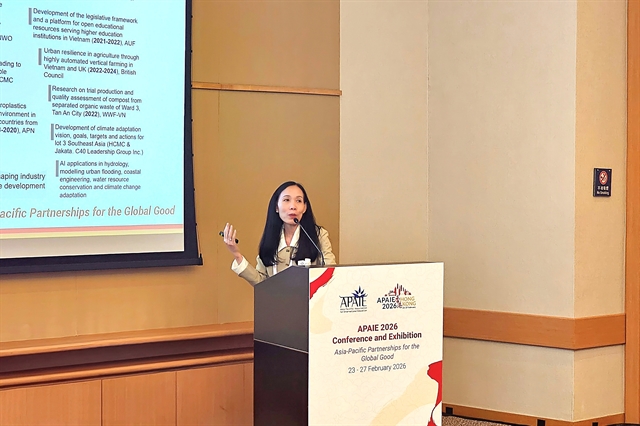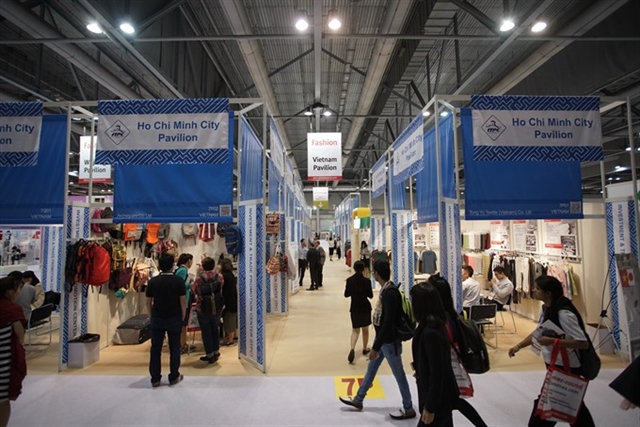 Economy
Economy

Vietnamese manufacturers must enhance their online platforms to increase their adaptability to disruptions and gain access to buyers in both traditional and new markets amid the COVID-19 pandemic, speakers told an online meeting in HCM City on Tuesday (June 9).

|
| Vietnamese garment and textile manufacturers display their goods at an international trade fair in Hong Kong last year. The Covid-19 outbreak means experts are now calling on manufacturers to enhance their online presence rather than depend on face-to-face interactions with buyers. VNS Photo Bồ Xuân Hiệp |
HCM CITY — Vietnamese manufacturers must enhance their online platforms to increase their adaptability to disruptions and gain access to buyers in both traditional and new markets amid the COVID-19 pandemic, experts have said.
Cao Thị Phi Vân, deputy director of the HCM City Investment and Trade Promotion Centre (ITPC), said despite the pandemic, Việt Nam is considered a safe investment destination by the international community thanks to its political and social stability and high economic growth.
Việt Nam has basically contained the outbreak and started to restore production and business activities, but its exports have been seriously affected by the pandemic as many of its major markets are still under lockdown and global trade has been disrupted by travel restrictions, she said at an online meeting on Tuesday in HCM City (June 9).
To recover foreign trade, Vietnamese enterprise must take advantage of online platforms to maintain their links with traditional partners and identify new importers since the pandemic could take a long time to end, she said.
While offline platforms enable suppliers and buyers to meet face-to-face and gain credibility, online platforms are the most convenient channel, providing year-round exposure for buyers to check and learn about suppliers’ capability and submit online inquiries, she said.
Thiery Mermet, CEO of Source of Asia, an international business development company based in HCM City, said the outbreak has already affected the whole economy, changing consumers’ buying habits, forcing many businesses to adapt to better serve customers’ online shopping needs since traditional sales channels have been affected.
Sellers and buyers are no longer able to directly interact with each other, adding more challenges to market forecasting and significantly reducing business opportunities, he said.
Amid the outbreak, businesses have the option of either reducing production and waiting for the pandemic to end or actively renovating themselves and coming up with new business strategies and new marketing tools, he said.
The first option is safer but only those who choose to change can make use of the gaping holes in the global supply chains and be fully prepared when the pandemic ends, he said.
Zacharie Blondeau, supply manager of SOA, said the most traditional and effective way to connect with international trade is face-to-face to share information and verify products before making decisions, but the current outbreak has made this mode unfeasible.
“Online platforms are considered one of the most effective ways for exporters to boost exports.”
To maintain the flow of goods and find new customers, businesses must actively switch to online platforms, he said, adding Instead of inviting customers to trade fairs of visiting factories, businesses could connect with customers through online tools and use virtual reality technology to introduce products.
Blandie de Quatrebarber, director of international relations at SOA, said Vietnamese businesses should employ digital tools to seek new customers.
“They should make their products regularly available on online platforms such as websites and social media, and maintain close contact and become familiar with customers and their cultures.”
Other experts said businesses should be aware that online business could become popular in future thanks to cost and time savings.
So businesses need to build appropriate marketing tools and strengthen their connection with local support services providers in target markets to quickly access the markets, they said.
They also need to research and develop new products, to catch up with consumer trends to conquer the market, they suggested.
Manufacturers should also study prices, consumer tastes and trends in potential markets, and have labels and packaging in English and the local language, they said.
They should also focus on building brands, using technology in production and improving designs, they said.
Many Vietnamese SMEs have little experience in digital or online marketing and lack information about the field and quality human resources, according to the experts.
A recent survey by Global Sources, a B2B media company based in Hong Kong, found that 80 per cent of global buyers preview product and supplier information online before they decide to go to a show to meet with targeted suppliers. — VNS




